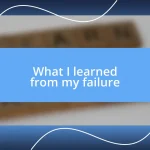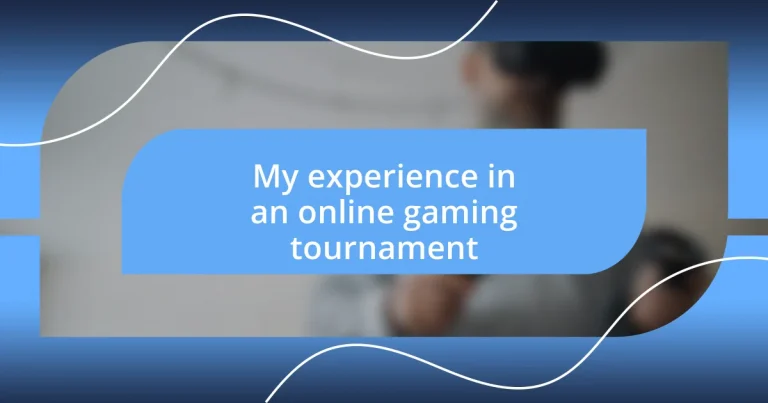Key takeaways:
- Online gaming tournaments create a unique sense of community and competition among diverse players worldwide.
- Preparation, including research, practice, and equipment checks, is essential for success in tournaments.
- Adaptability, effective communication, and a positive mindset are crucial strategies for overcoming challenges and enhancing performance during competitions.
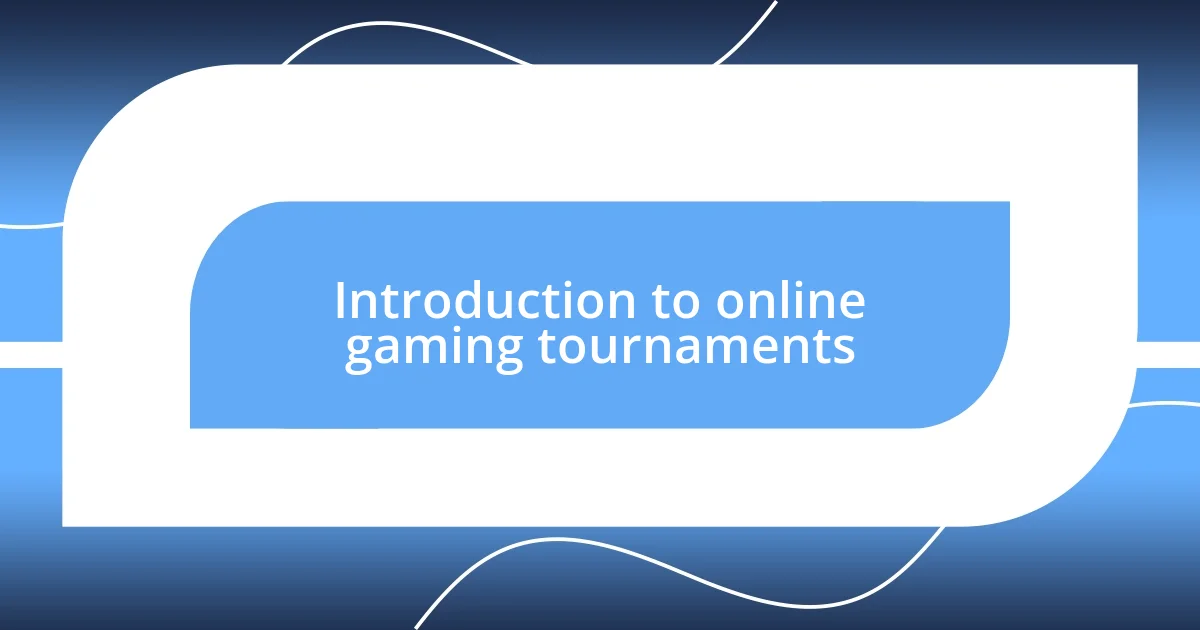
Introduction to online gaming tournaments
Online gaming tournaments have surged in popularity over the last decade. I still remember the rush of adrenaline the first time I joined a tournament, the excitement buzzing around me as I faced off against players from all over the globe. It’s incredible to think that these virtual arenas can connect so many diverse players through a shared love for gaming.
What really fascinates me is how online tournaments encapsulate intense competition and camaraderie simultaneously. Sometimes, I’d find myself strategizing late into the night, feeling that exhilarating blend of anxiety and hope as I advanced through each round. Have you ever experienced that moment when a victory just feels like a celebration with teammates, even if you’ve never met face-to-face? Those moments solidify the unique bond gamers share, transcending geographical barriers.
As I delved deeper into the world of online competitions, I uncovered a wide array of formats and styles, each offering something different. From massive global events with thousands of participants to smaller community-focused tournaments, they’re tailored to suit every gamer’s preference. Isn’t it amazing how these digital gatherings can create a sense of belonging, fostering friendships and rivalries in equal measure?
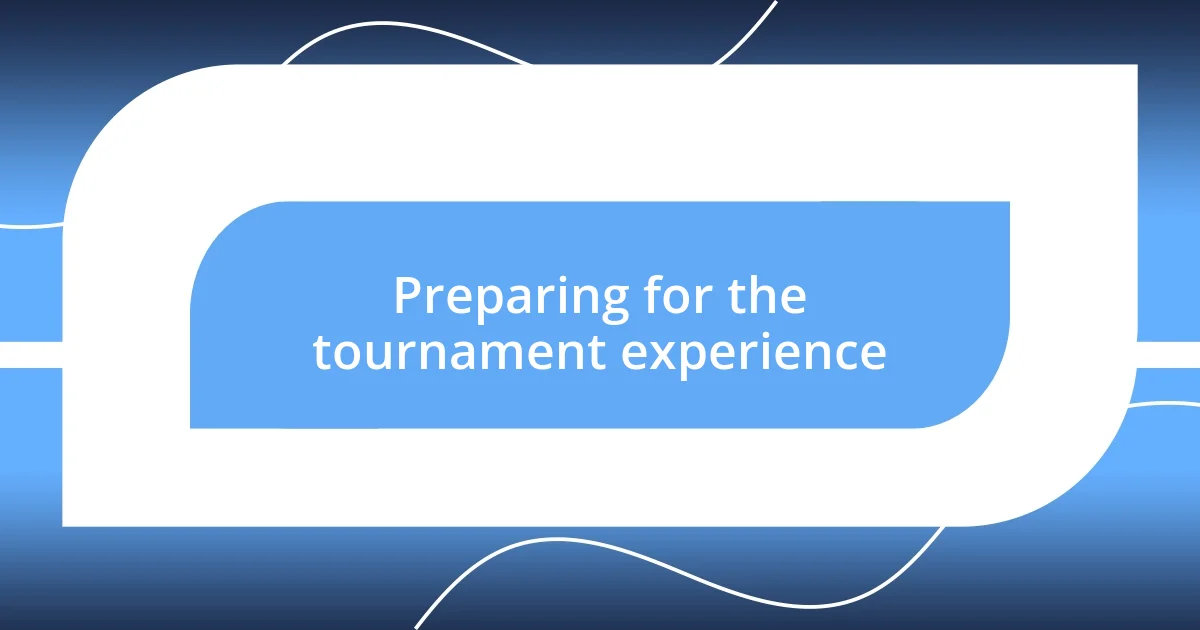
Preparing for the tournament experience
Preparing for an online gaming tournament can feel like gearing up for a significant event in life; it takes dedication and focus. I remember the hours I spent fine-tuning my skills, practicing specific strategies, and studying my potential opponents. This preparation isn’t just about gaming—it’s about mental readiness and building the right mindset.
Here are some essentials that I found helpful in my journey:
- Research Your Opponents: Knowing their play style can give you a strategic edge.
- Practice Regularly: Set aside dedicated practice time, focusing on both individual skills and teamwork.
- Understand the Tournament Rules: Familiarize yourself with the format and regulations to avoid any surprises.
- Test Your Equipment: Ensure your gaming gear, from your headset to your mouse, is functioning flawlessly.
- Get Enough Rest: Sleep well before the tournament to ensure you’re alert and focused.
In my experience, preparing also meant setting up a comfortable gaming environment. I often found that minor adjustments, like the right chair or optimal lighting, could greatly affect my performance and concentration during the tournament. Creating a space where I felt both relaxed and in the zone became critical as I approached the big day.
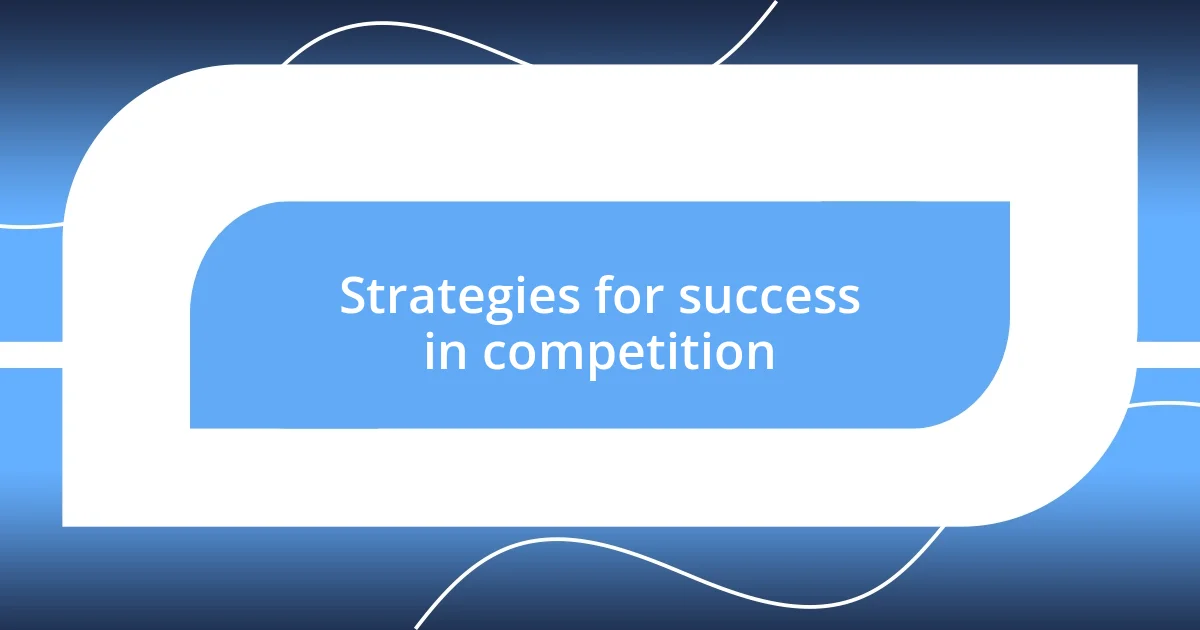
Strategies for success in competition
When it comes to succeeding in an online gaming tournament, having a solid strategy is crucial. I’ve learned that adapting my gameplay based on ongoing observations can be a game-changer. Just the other day, during a particularly tense match, I noticed my opponent was overcommitting to aggressive plays. I decided to shift my strategy to lure them into traps instead of matching their pace. This adjustment not only turned the tide in my favor but also underscored the importance of flexibility in competitive play.
Another strategy that has proven invaluable in my tournaments is communication. I can’t stress enough how clear and open communication with teammates sets the stage for success. In one memorable tournament, our team found ourselves in a tight spot, and it was through effective communication that we devised a comeback plan that led us to victory. Every player knowing their role and being able to express their thoughts freely transforms a group of individual players into a cohesive unit, ready to tackle any challenge.
Lastly, maintaining a positive mindset is essential. There were instances where I faced setbacks that felt overwhelming. Having the right mental framework made a difference; I started viewing each loss as an opportunity to learn rather than a failure. This shift not only improved my gameplay but also my overall enjoyment of the tournament experience. After all, isn’t the ultimate goal to grow as a player and person while having fun along the way?
| Strategy | Details |
|---|---|
| Flexibility | Adapt your gameplay based on opponents’ styles and actions. |
| Communication | Encourage open discussions with teammates for better coordination. |
| Positive Mindset | Focus on learning from losses to improve in future matches. |
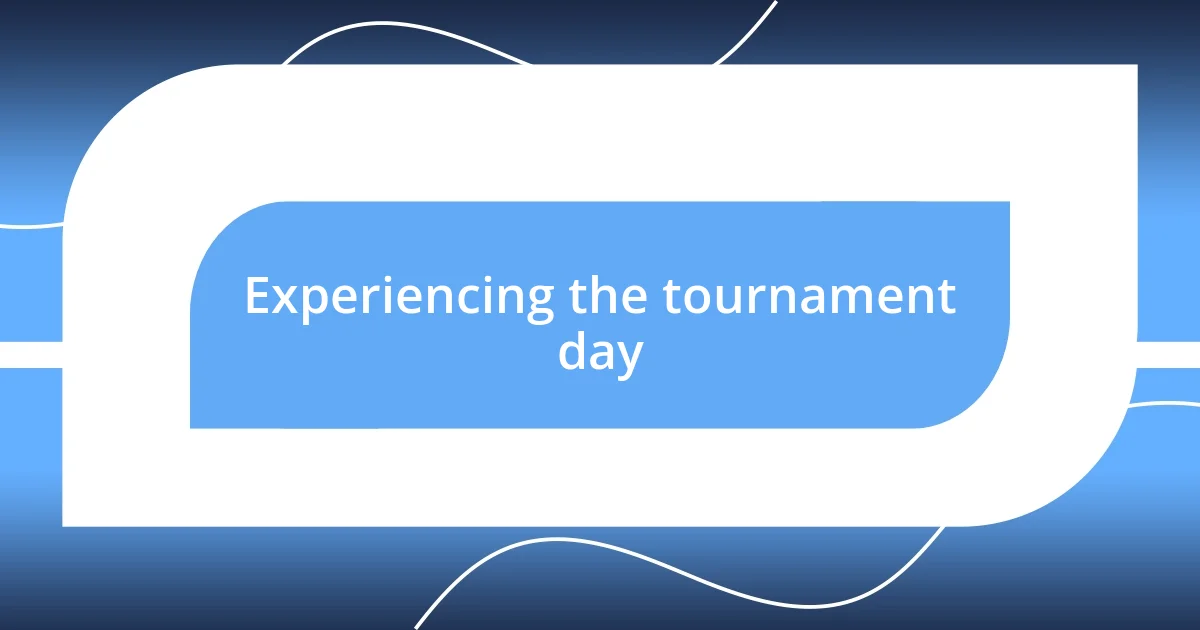
Experiencing the tournament day
The day of the tournament was electrifying. I remember sitting in front of my computer, my heart racing with anticipation. The chat was buzzing with excitement and nerves, and I felt a thrill just being part of that vibrant energy. Could this be the moment I showcase all my hard work?
As matches began, I experienced a blend of emotions—anxiety, exhilaration, and focus. I noticed how every time I won a round, a wave of confidence washed over me. I vividly recall one particular match where, with just seconds left on the clock, I made a risky move that ultimately clinched the game for my team. That moment was a reminder of how high-stakes decisions can lead to either triumph or defeat. It really made me reflect: is the pressure of the tournament an adversary or a catalyst for greatness?
During the breaks between rounds, I used that time to recharge mentally. I’d lean back, take deep breaths, and let my mind clear. I found it fascinating how, just a few moments of mindfulness could shift my perspective. Some teammates opted for quick, distracting games or chatting, while I preferred to refocus. How do you prepare during those pivotal breaks? I truly believe that recalibrating my mindset led me to approach each subsequent match with renewed energy and clarity. The tournament was not just a test of skill, but a profound journey of self-discovery.
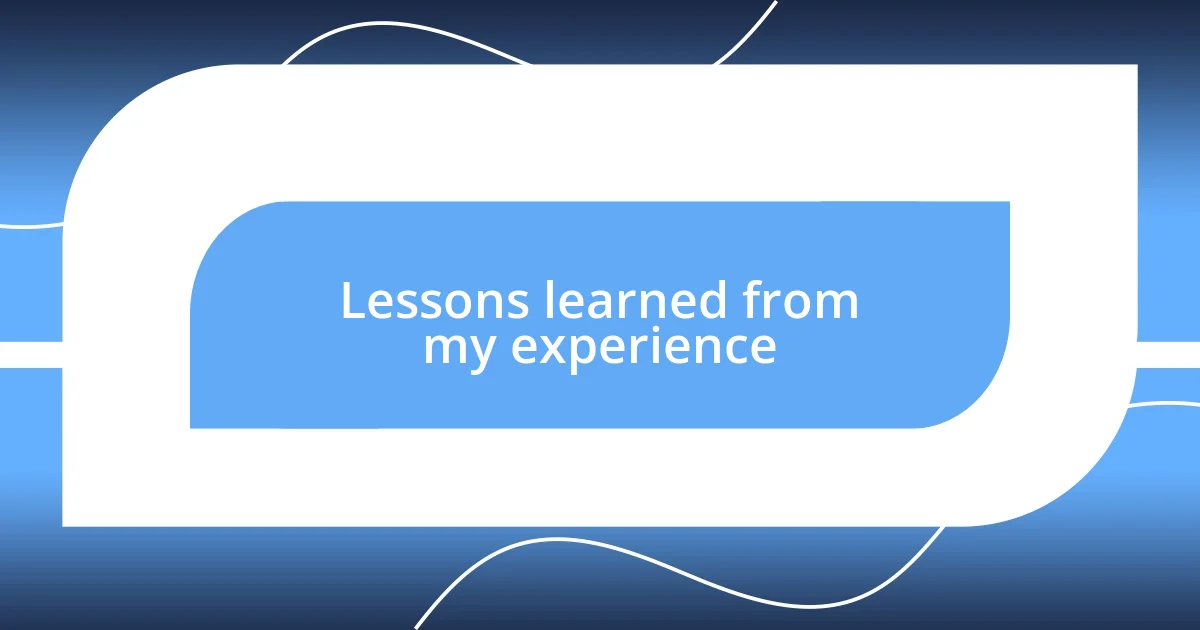
Lessons learned from my experience
Reflecting on my tournament experiences, one key lesson I learned was the power of adaptability. I remember a moment during an intense match where everything seemed to be going south. My initial game plan wasn’t working, and I felt the pressure mounting. Instead of panicking, I took a breath and adjusted my tactics. This unexpected shift not only salvaged the round but also taught me to embrace change in the midst of chaos. Isn’t it fascinating how a slight change can shift the tide of a competition?
Another significant takeaway for me was the importance of preparation. Before this tournament, I underestimated just how thorough my training needed to be. I’ll never forget the days leading up to the event, filled with late-night practice sessions and reviewing game footage. This prep work solidified my skills and gave me the confidence I needed on the tournament day. How often do we underestimate the value of hard work behind the scenes?
Lastly, my journey solidified the idea that camaraderie matters immensely. Throughout the tournament, I formed deep connections with my teammates, and those relationships became a source of strength. After a tough match loss, we gathered together to analyze what went wrong, not just as competitors but as friends. In moments of despair, our shared laughter and support reminded me that, while winning is thrilling, the friendships forged during these experiences are irreplaceable. Wouldn’t you agree that sometimes the bonds we build can be just as rewarding as the trophies?
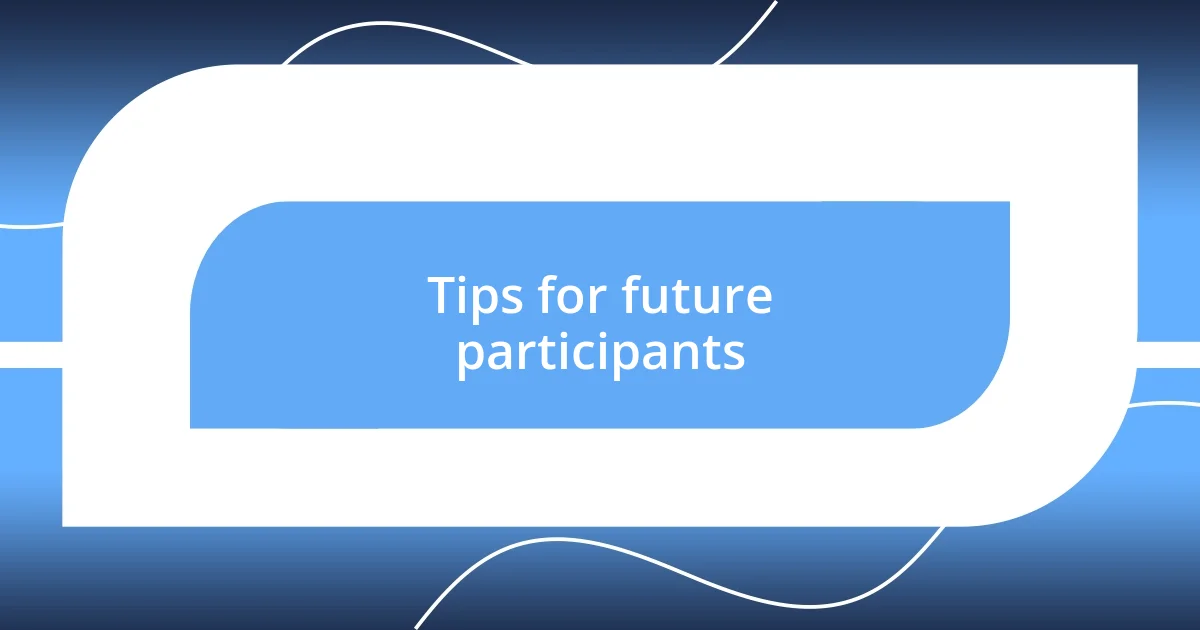
Tips for future participants
As a future participant, I recommend familiarizing yourself with the gaming platform before the tournament day. I remember the initial confusion I felt when I encountered unexpected features or settings during my first tournament. Taking the time to explore and practice in the environment can save you from unnecessary stress and help you focus on what really matters: your gameplay. Have you ever been thrown off by a simple technical issue during a crucial moment?
Communication with your team is essential. During my experience, I noticed that teams that communicated effectively had a significant edge over their opponents. Whether it was through voice chat or in-game signals, keeping a steady flow of information helped build trust and enhance our strategies. Think back to a time when clear communication made a difference in your team’s performance—how much smoother did things go?
Lastly, don’t underestimate the power of relaxation techniques. I often found that a few minutes of stretching or even stepping away from the screen helped me maintain my focus during the long hours of competition. When the tension builds, I’ve seen that a short break can do wonders for your mental game. How do you recharge when the pressure mounts? Finding your own rhythm can be a game-changer in those heated moments.


